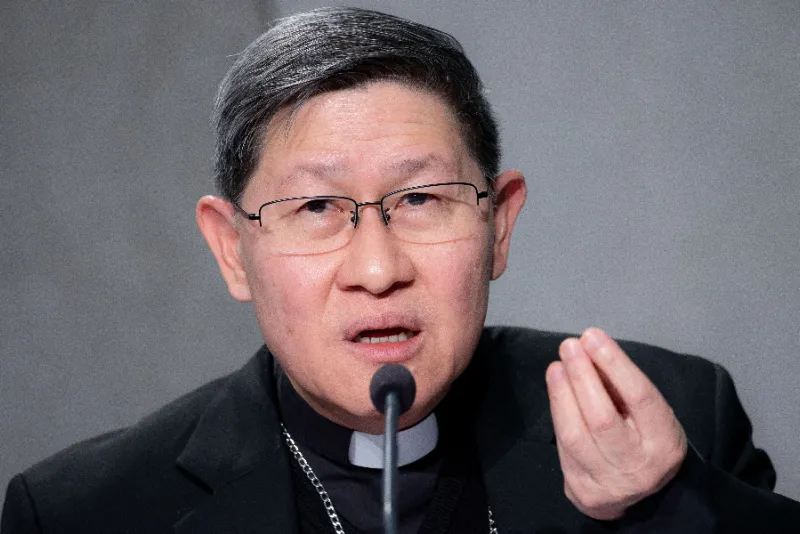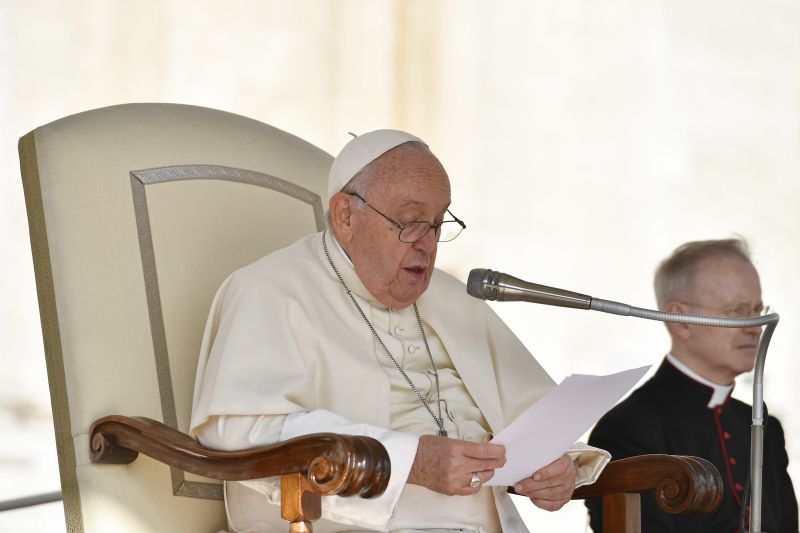
Rome Newsroom, Oct 25, 2022 / 07:50 am (CNA).
Cardinal Luis Antonio Tagle has defended the Vatican’s decision to renew its provisional agreement with China on the appointment of bishops.
The Filipino cardinal, considered a contender to become the Catholic Church’s first Asian pope, said that the Holy See signed the agreement “to safeguard the valid apostolic succession and the sacramental nature of the Catholic Church in China.”
“And this can reassure, comfort, and enliven baptized Catholics in China,” Tagle said in an interview published on Oct. 22 on the Vatican’s official media channels.
When asked in the interview for his response to critics of the agreement who say that the Holy See’s dealings with Beijing have led to the Vatican’s silence on the sufferings and problems of Chinese Catholics, Tagle said:
“In dialogue, the Holy See has its own respectful style of communicating with representatives of the Chinese government, but which never ignores and indeed always makes present the situations of suffering of Catholic communities, which sometimes arise from inappropriate pressures and interference.”
The Vatican announced that it had renewed its agreement with China for an additional two years on the same weekend that Chinese President Xi Jinping secured a third term as the leader of the Chinese Communist Party.
China’s National People’s Congress confirmed a constitutional change eliminating term limits granting Xi the possibility of lifelong rule in 2018, six months before the Holy See first signed its deal with Beijing.
Under Xi’s leadership, respect for human rights and religious freedom has deteriorated. Xi has come under mounting international condemnation for China’s brutal persecution of Uyghur Muslims in the northwest Chinese region of Xinjiang, and state officials in different regions of China have removed crosses and demolished church buildings.
Tagle, who was called to Rome in 2019 to head the Congregation for the Evangelization of Peoples, said that the open channel for dialogue with Chinese government authorities has been good in itself.
“Listening to the arguments and objections of the government also leads us to take into account the contexts and the ‘mindset’ of our interlocutors. We discover that things that are absolutely clear and almost obvious to us can be new and unknown to them,” he said.
The cardinal cited his own Chinese heritage, saying that the memory of his maternal grandfather, whom he described as a “pragmatic Chinese Catholic,” has helped him to “consider what can be more useful in the dialogue with the Chinese government.”
“Now, when I consider the dialogue with the Chinese government on ecclesial issues, I think that sometimes it is better to look for simple and direct arguments, to meet the concrete and pragmatic approach of our interlocutors,” Tagle said.
The provisional agreement between the Vatican and China was first signed in September 2018 and renewed for another two years in October 2020. The terms of the deal have not been made public.
The Vatican publicized the renewal of its agreement with China five days before Cardinal Joseph Zen, the bishop emeritus of Hong Kong, is scheduled to appear again in court. Zen was arrested in May along with other democracy activists under Hong Kong’s strict national security law and has been one of the most outspoken critics of the Vatican’s agreement with China.
Tagle said in the interview that the Vatican is aware of negative reactions to the agreement among some Chinese Catholics and considers it “part of the process.”
“The Holy See does not ignore and does not even minimize the differences of reactions among Chinese Catholics in the face of the agreement, where the joy of many is intertwined with the perplexities of others. It is part of the process,” he said.
“But one always has to dirty ones hands with the reality of things as they are. Many signs attest that many Chinese Catholics have grasped the inspiration followed by the Holy See in the ongoing process. They are grateful and comforted for a process that confirms before all their full communion with the Pope and the universal Church.”
If you value the news and views Catholic World Report provides, please consider donating to support our efforts. Your contribution will help us continue to make CWR available to all readers worldwide for free, without a subscription. Thank you for your generosity!
Click here for more information on donating to CWR. Click here to sign up for our newsletter.






“China’s National People’s Congress confirmed a constitutional change eliminating term limits granting Xi the possibility of lifelong rule in 2018, six months before the Holy See first signed its deal with Beijing.”
So I am wondering what Itally would be like today, had Pope Pious XII signed all Catholic Spiritual power and authority, in Italy and Germany, over to Adolph Hitler and his Nazi party, under this ‘lifelong rule’?
Jesus never even talked to Caesar, much less did Jesus order St. Peter to hand over all Catholic Spiritual power and authority over to Caesar, in the hopes of ‘dialog’ with the Monster.
As a mediocratic kiss-up would.
As one totally unqualified to toss out a comment on the Provisional Agreement—whether the Church is hanging by such a thread in China that preservation of the Apostolic Succession is the absolute last straw, this reader does wonder about the relevance of Cardinal Tagle’s “Chinese heritage,” and about his future message as head of the dicastery (no longer Congregation) for the Evangelization of Peoples.
Of the perennial Catholic Church, is Tagle signaling a pragmatic and even nationalist/synodalist tilt for the polyhedral Church?
The Trappist monk, Thomas Merton, was very open to the religions of Asia (not including the “mindset” of the Westernized/atheist party mandarins of today), and in his biography offers this different view about polyhedrons…”When a ray of light strikes a crystal [polyhedron], it gives a new quality to the crystal. And when God’s infinitely disinterested love plays upon the human soul, the same kind of thing takes place. And that is the life called sanctifying grace.”
The visible/papabile Cardinal Tagle also speaks of “the [still] sacramental nature of the Catholic Church in China.” Well, under the equally hostile “mindset” of the Roman Empire, suddenly we did witness the pivotal role of the secular Constantine in advancing the life of the Church (legalization, then convening of the Council of Nicaea).
Still, we probably should not attribute everything good that pops up in our chaotic world as the “inspiration” of the Holy Spirit. Is the provisional agreement the best of a really bad situation in a sea (See?) of chaotic syncretism (the sociologist Pitirim Sorokin’s expression for periods of cultural freefall)? Or not?
Bridge-building is vital for world-rebuilding.